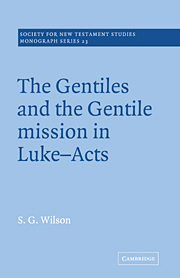Book contents
- Frontmatter
- Contents
- Abbreviations
- Preface
- 1 Jesus and the Gentiles
- 2 The Gentiles in Luke's Gospel
- 3 Lukan eschatology
- 4 The early chapters of Acts
- 5 Stephen and the Hellenists
- 6 Paul's conversion
- 7 Cornelius and the Apostolic Council
- 8 Paul's speech on the Areopagus
- 9 Jewish and Gentile missions
- 10 Summary and conclusions
- Bibliography
- Index of passages
- Index of authors
- Index of subjects
10 - Summary and conclusions
Published online by Cambridge University Press: 04 March 2010
- Frontmatter
- Contents
- Abbreviations
- Preface
- 1 Jesus and the Gentiles
- 2 The Gentiles in Luke's Gospel
- 3 Lukan eschatology
- 4 The early chapters of Acts
- 5 Stephen and the Hellenists
- 6 Paul's conversion
- 7 Cornelius and the Apostolic Council
- 8 Paul's speech on the Areopagus
- 9 Jewish and Gentile missions
- 10 Summary and conclusions
- Bibliography
- Index of passages
- Index of authors
- Index of subjects
Summary
In this final section two major tasks will be undertaken, namely a consideration of the Gentile mission in Luke–Acts from both a theological and a historical viewpoint. The first section will be a summary of the ‘theology’ of the Gentiles in Luke–Acts, including a comparison with Paul's epistles. The second will consist of a drawing-together of the varied results which, on the question of historical reliability, have been reached in the detailed study of those sections of Acts which concerned us, and the use of these to guide us in our assessment of Luke as a historian.
THE THEOLOGY OF THE GENTILES
The word ‘theology’ is used here as the most convenient way of distinguishing this section from the next, which is concerned chiefly with the historical question. As will become apparent, the description of Luke's approach to the Gentiles as ‘theological’ is misleading, for the most striking characteristic of Luke–Acts is precisely the lack of any consistent theology of the Gentiles.
Associated themes
At various points in earlier chapters we have noted how certain themes are frequently associated with the Gentile mission, either directly or by implication. They are not always related to it in a systematic way, but the fact that they arise in related contexts shows that there is some connection between them in Luke's mind.
<>The first is the connection, albeit indirect, with Jerusalem. As we have noted earlier, several writers have worked out the role which Jerusalem plays in Luke–Acts. It acts as one of the essential links which bind together the two volumes.
- Type
- Chapter
- Information
- The Gentiles and the Gentile Mission in Luke-Acts , pp. 239 - 267Publisher: Cambridge University PressPrint publication year: 1973



